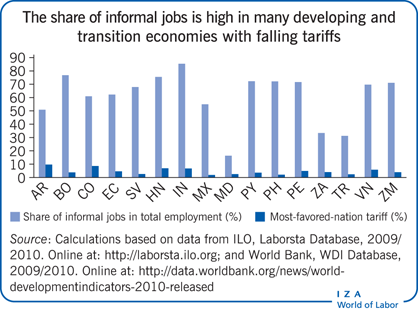Elevator pitch
The evidence is mixed on whether informal labor in developing countries benefits from trade and labor market reforms. Reforms lead to higher wages and improved employment conditions in the informal sector in some cases, and to the opposite effect in others. At a cross-country level, lifting trade protection boosts informal-sector employment. The direction and size of the impacts on informal-sector employment and wages are determined by capital mobility and the interactions between trade and labor market reforms and public policies, such as monitoring the formal sector. To guarantee best practice policymakers need to take these interdependencies into account.

Key findings
Pros
Trade reform and capital mobility have important implications for informal sector labor through direct production relationships and indirect linkages.
Trade reforms and better access to credit improve the wage and employment conditions of unskilled workers in the informal sector.
Following a phase of high capital mobility, informal firms register higher labor productivity despite an influx of workers to the sector.
Labor market reforms that follow trade reforms are expected to raise the informal wage.
Cons
Without sufficient capital mobility, job losses in formal sector industries lead to lower wages in the informal sector.
Expansion of informal activities following trade reform results in lower productivity and economic growth.
Improper implementation of labor market reforms may aggravate informality within formal units and exacerbate wage and employment conditions in informal firms.
Without unemployment insurance, trade reforms that increase foreign competition may push the government toward greater acceptance of informal arrangements.